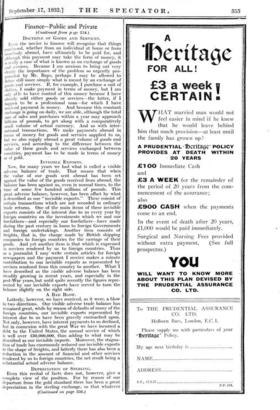Finance—Public and Private (Continued from pigs 354.)
DOCTRINE OF GOODS AND SERVICES.
Even the novice in finance will recognize that things purchased, whether from an individual at home or from somebody abroad, have ultimately to be paid for, and although this payment may take the form of money, it is really a ease of what is known as an exchange of goods and services. Because I am anxious to bring out very clearly the importance of the problem so urgently pro- pounded by Mr. Baps, perhaps I may be allowed to define still more simply what is meant by an exchange of goods and services. If, for example, I purchase a suit of clothes, I make payment in terms of money, but I am only able to have control- of this money because I have already sold either goods or services—the latter, if I happen to be a professional man—for which I have received payment in money. And because this constant exchange is going on daily, we are able, although the total sum of sales and purchases within a year may approach billions of pounds, to get along- with a comparatively small volume of actual currency. And so with inter- national transactions. We make payments abroad in terms of money for goods and services supplied to us, but we also supply abroad a great volume of goods and services, and according to the difference between the value of these goods and services exchanged between countries, payment has to be made in terms of money or of gold.






























 Previous page
Previous page